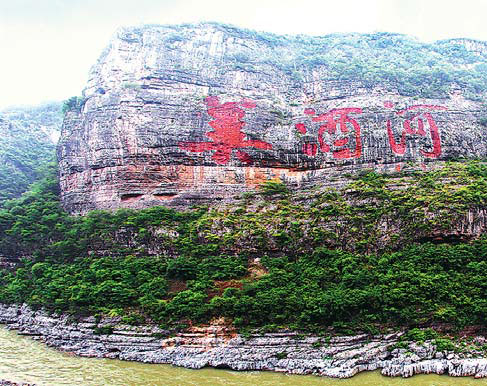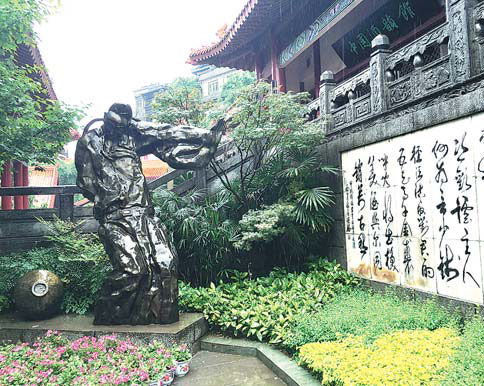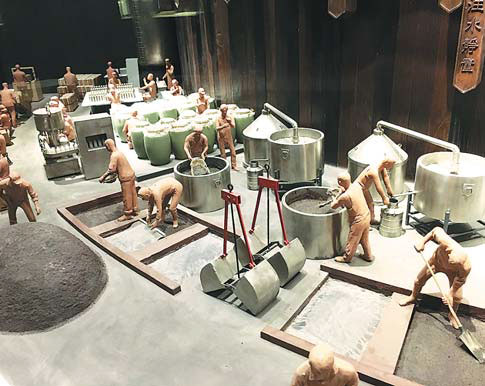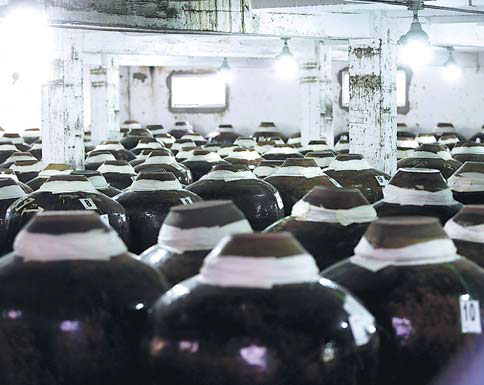Life, Liquor And Legacy
A Visit To The Home Of Moutai Recalls The Works Of A Great Tang Poet, Mike Peters Reports.
If there is such a thing as reincarnation, and if I have a choice, I hope to come back as Li Bai (701-762).
"He would make wine and drink wine and be drunk, and then write poems," explains my guide in Renhuai as we contemplate an immense statue of the poet and brewer, immortality in a not-so-erect position.
You might assume that this pose was his most natural one, that most of the time Li Bai couldn't get upright. But when I sit next to him, I get a different sense. If the sculptor of this work saw what I see, Li Bai rests in contemplation of the Chishui River.
In the valley below us, the river courses through Guizhou province and along the border of Sichuan province, after a week of stormy weather. The water is high and reddish, thanks to the runoff from the surrounding hills. It looks too muddy to drink, but in my imagination, Li Bai licks his lips in anticipation.
He is not the only artist to see the appeal of these waters. A little downstream, three immense red Chinese characters are painted on the cliffs that tower above. Mei jiu he, they read: "Beautiful liquor river".
"Without the special waters of our river," says a Moutai official during our visit to the company headquarters, "we have nothing. The river forms a golden delta that sustains communities - and hundreds of distilleries in Guizhou and Sichuan provinces."
An old saying in Chinese liquor making is more poetic: "Water is alcohol's lifeblood, qu (the yeast-like fermenter) is alcohol's backbone, and grains are alcohol's flesh." I'm not sure if Li Bai came up with this one, but it seems to have inspired generations of distillers.
Water plays a part in every stage of baijiu production, notes Derek Sandhaus in his book Baijiu: The Essential Guide to Chinese Spirits.
"Water may seem the antithesis of China's fiery liquor," says Sandhaus, who was recently invited to speak at a Moutai-sponsored forum on trends in the liquor industry. But "it washes and steams the grain. It adds the moisture that helps trigger fermentation. Its steam passes through the fermented grains during solid-state distillation. After a spirit has been aged, water is again added to dilute the alcohol to the desired strength."
The minerals in water will affect the spirit's final character and flavor, and monitoring the water quality during the first steps of Moutai-making is the task of Yan Gang, assistant director of liquor making workshop No 16 at the distillery. Yan says it takes about a year to make the base liquor, after which Moutai will go through multiple distillations and aging. Most Moutai on store shelves is five years old, though premium grades are aged much longer.
Southwestern China, where most of the nation's baijiu is made, tends to have relatively neutral water of medium "hardness", rich in calcium and magnesium. That increases the acidity of the mash (fermenting grains), breaks down proteins and stimulates yeast development - all ideal for baijiu-making. "Soft" water is an excellent solvent but does not contain enough of the coveted mineral content, while "hard" water is too acidic and prone to form solids in the alcohol.
"Chinese distillers believe the quality of their water source to be inseparable from the quality of their alcohol," Sandhaus writes in his book, "giving rise to the maxim, 'Famous alcohols need outstanding springs.' If a distillery were to relocate, even only slightly upstream, it would alter the alcohol's character."
The Renhuai distillery draws water each year from the river during the Tomb-Sweeping Festival, and different stages of production occur on other holidays in a tradition-bound sequence.
Peng Jing, deputy assistant director of the wine storeroom and a first-class taster, notes that the company's 90 tasters are coached by the company to maintain a healthy lifestyle, including drinking in moderation when off duty. The tasting ability of each member of the team, at every level, is retested each year.
The Chishui River is said to give Guizhou life, liquor and legacy. Locals treasure the surrounding red soil for its minerals, which are said to give a special quality to local liquors like Moutai.
But there is another sense that the river is Red, for which it is equally revered. The waters are the setting for one of the most dramatic stories of China's civil war, says Du Yu, manager of online publicity for the nearby city of Zunyi.
The Red Army found itself on its banks in 1935 after a crushing defeat by Nationalist troops. With its 30,000 troops in disarray and 400,000 Kuomintang soldiers pretty much surrounding them, the Party shuffled its top leadership, putting Mao Zedong in charge for the first time. Mao devised a strategy that required crisscrossing the Chishui four times, to divert the Nationalists. It was a stunning success, and the Red Army ultimately broke through to fight another day. The site of the third crossing is at Zunyi; the fourth is near the Moutai distillery at Renhuai.
"The river gives us a green city, Red history," says a smiling Du.
The writer is a copy editor with China Daily. Contact the writer at michaelpeters@chinadaily.com.cn.
|
A panoramic view of Maotai town, Renhuai city, in Southwest China's Guizhou province. The town is located on the east bank of the Chishui River, which is believed to give a special quality to local liquors such as Moutai. Provided To China Daily |
|
Painted on a cliff along the Chishui River, these characters say 'beautiful liquor river'. Qiu Guoyu / For China Daily |
|
|
|
Miniature exhibits at the Chinese Liquor Culture City showcase the steps required to make Moutai. Miguel Villanueva / For China Daily |
|
Moutai Group's liquor storage cellar. Jiang Dong / China Daily |
(China Daily 07/08/2016 page6)



















